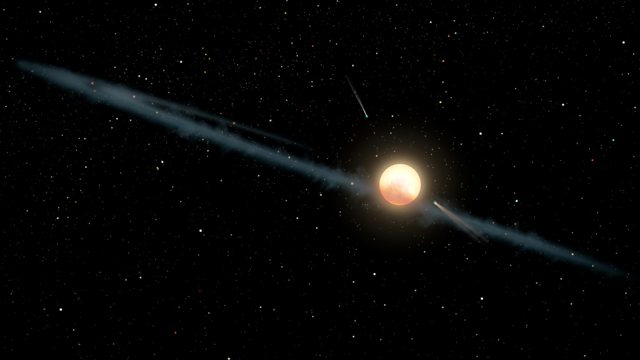
The Galaxy’s Most Peculiar Flickering Star
Peculiar flickering star; Surgery in Africa; Sugar and C.difficile; Plant nanobionics; Women’s concussion; Blue zones and old age
KIC 8462852 is otherwise an average star, about a 1,000 light years away in the constellation Cygnus. It is about 50 percent bigger and 1,000 degrees hotter than the Sun, which is not particularly peculiar. What is very peculiar is that it flickers and dims in a way that has never been observed in any star so far. This led to some intense debate amongst the astrophysics community, and the press, including the possibility that the dimming was being caused by some sort of alien megastructure – A ‘Dyson Sphere’, set up to harness the power of the star. New work sheds some light of this very strange star (spoiler alert, it’s never aliens!)
Surgery in Africa
Twice as many people die during or after surgery in Africa than on average around the world, according to a new study. The patients – from 250 hospitals in 25 countries - fared worse even though they were young and fit and the operations were often minor. Professor Bruce Biccard tells Claudia Hammond that many of the deaths could be prevented – if patients were monitored properly after their operations.
Sugar and C.difficile
Did the widespread introduction of the food additive trehalose fuel the emergence of epidemics of virulent Clostridium difficile in hospitals from the early 2000s? Microbiologist Robert Britton tells Adam Rutherford about the evidence his team has gathered and published this week in the journal 'Nature'.
Glowing Plants / Plant Nanobionics
Plants may not be the obvious starting point for new technology, but in fact they offer many advantages that our electronics do not. A team from MIT have created a glowing plant using nanoparticles that can enter previously impenetrable parts of the plant cell. Their work is part of a new field called plant nanobionics and is paving the way for plants that can light up highways.
Women’s Concussion
Some researchers believe that women’s brains might be at greater risk of concussion than men if they sustain a head injury playing sport. New research from the Centre for Brain Injury and Repair at the University of Pennsylvania has tried to pin down what might be happening. They found that brain cells from female rats and human stem cells sustained more damage than those of males.
Blue Zones
Villagrande in Sardinia is a “Blue Zone”. A Blue Zone is a ‘longevity hotspot’. A region with a much higher proportion than average of people over 100. Sardinia is not the only place where a larger percentage of people get to celebrate their 100th birthday. Also Greece, Japan and Costa Rica, all have Blue Zones. Now you would expect such zones to be a perfect opportunity for scientists to try and find out the secret to a long life. But how easy would it be?
(Image caption: Tabby's Star (Illustration) - credit: Nasa)
The Science Hour was presented by Roland Pease with comments from Nature podcast editor, Kerri Smith
Producer: Katy Takatsuki
Last on
More episodes
Previous
Broadcast
- Sat 6 Jan 2018 12:06GMT���˿��� World Service Americas and the Caribbean
Podcast
-
![]()
Unexpected Elements
The news you know, the science you don't

